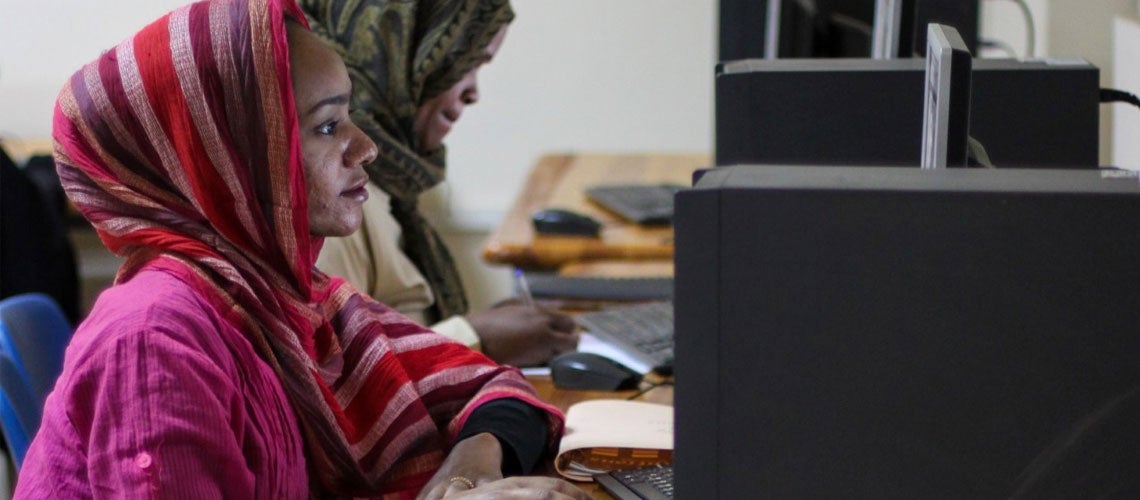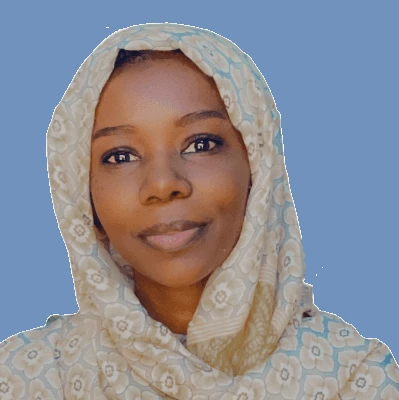 Women at Sudan University using computers. Photo: Sarah Farhat/ The World Bank
Women at Sudan University using computers. Photo: Sarah Farhat/ The World Bank
This year’s UN theme for International Women’s Day was DigitALL – Innovation and Technology for Gender Equality. Digital technologies are at the forefront of development and provide a unique opportunity for countries to accelerate economic growth and connect citizens to services and jobs. But digital technologies could lead to more economic and social inequalities unless women are empowered by having access to technology and acquiring the skills needed to benefit from it.
Digital technologies for gender equality
I have dreamed of gender equality that not only provides equal access to opportunities but also guarantees the equal ability to benefit from them. Unfortunately, women struggle in tons of battles to achieve the same goal that men can achieve with less effort; this because women are still tied down with societal responsibilities and frequently need to fight, psychologically, economically, socially, and even physically to get ahead. There is a wide spectrum of challenges faced by women across social classes, economic classes, and geographical areas.
Women in remote areas and lower social/economic classes lack access to the power needed to charge their phones, if they are lucky enough to even have phones. Women are 7% less likely than men to own a mobile phone and are 16% less likely to use mobile internet; the situation is worst in Sub-Saharan Africa and South Asia with gender gaps of around 37% and 41% respectively (The Mobile Gender Gap Report 2022 - GSMA).
For this category, the journey for women’s digital gender equality starts by supporting their acquisition of mobile phones, provision of sustainable and affordable means to charge those phones, cheap or free call/internet tariffs , provision of free hotlines to answer their inquiries, and delivery of digital training.
In my previous blog “Dev-Techs”: Accelerating digital economy in the post-COVID-19 era I mentioned that - Digital exclusion leads to social and economic exclusion. The bright side is that the opposite is also true!. Thinking positively, there are huge opportunities for women to unlock better social and economic lives if they acquire the skills needed in the digital economy; women should be empowered by having access to technology and acquiring the skills needed to benefit from it. They need to know how to use phones, access the internet, search for information, share information at the level of buying/selling goods, be able to access funds, and do e-payments.
“Innovation is the process of creating value by applying novel solutions to meaningful problems.” - Joe Dwyer, What Is Innovation?
When I was an undergraduate student, I was excited about knowing and experimenting with new technologies and trends, irrespective of the value that they brought in my context; I can say that I was thinking externally. Thereafter, through reflection and connection to my context, I built a development-centered mindset. I am still excited about technology, but I am more passionate about utilizing technology to bring real value and to use technology to solve everyday problems in my community, problems we might not even know about! This shift in my mindset let me approach my work in digital financial services with purpose. Having purpose let me work hard day and night in subsidy distribution in Sudan through digital financial services during the COVID-19 crisis. The same sense of purpose inspires me now, faithfully walking extra miles, spreading mobile money across the continent through my current occupation as a Solution Architect of mobile financial services.
Communities must be encouraged to innovate in solving their problems, they are the ones who suffer now, and the ones who will pick the fruits of their efforts later. It’s better to harmonize research and development efforts by attracting national talents to provide solutions to the problem of their community. Innovation is needed in the learning content itself, using micro-doses that are customized around the exact needs of women. Innovation is needed in building business models that are gender-focused around the currently available and affordable technologies.
“Achieving gender equality requires the engagement of women and men, girls and boys. It is everyone’s responsibility.” - Ban Ki-Moon.
I am enjoying my life now, supervising two undergraduate students in their final year project that aims to build an e-learning platform for a non-governmental organization that is concerned about education. It is a great opportunity for those students to be in touch with the challenges of their community and to contribute to solving them. I am brainstorming to see how solving community problems can be encouraged further, focusing on the theme of women’s empowerment through local or regional competitions.
Whoever you are, regardless of your gender, social occupation, and role, you have something to contribute!
If you are a man … try to walk in women’s shoes, empathize with them, and lend a helping hand.
If you are a woman … try to connect with other women and share inspiration and support.
If you are a mother or older sister… be a role model and be part of the new social norms that support women.
If you are a woman experiencing success and, know of opportunities, share your knowledge and bring another female up with you!


Join the Conversation